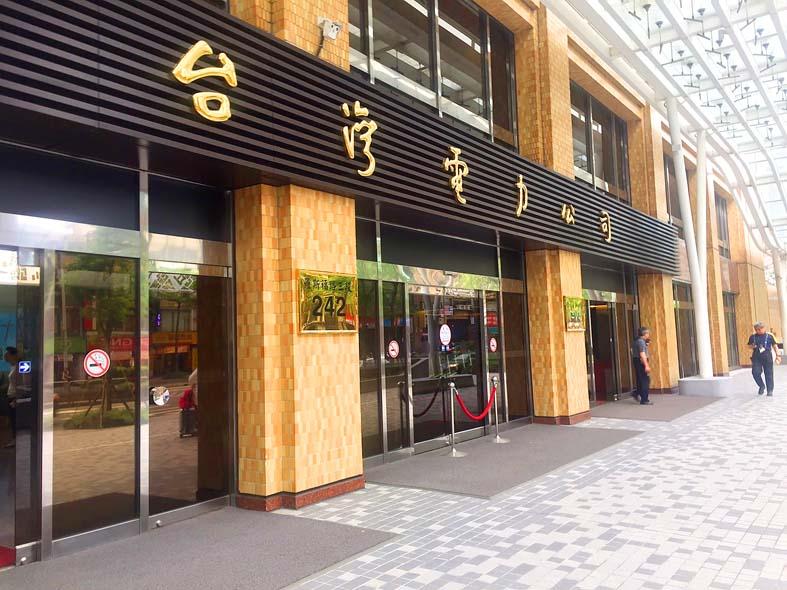Taiwan Power Co (Taipower, 台電) yesterday announced a plan to issue NT$17.65 billion (US$623.6 million) of unsecured corporate bonds next month, as the state-run utility aims to raise funds to build new liquefied natural gas (LNG) generators at the Taichung Power Plant, a combined-cycle LNG generator project in Taoyuan’s Datan Power Plant, the 7th Transmission and Substation Project as well as other investments.
The debt would comprise NT$3.4 billion of five-year bonds with a yield of 0.45 percent, NT$10.55 billion of seven-year bonds with a yield of 0.55 percent and NT$3.7 billion of 10-year bonds with a yield of 0.62 percent, Taipower said in a statement.
The bond sale would be Taipower’s first this year and the utility would repay bondholders with a lump sum at maturity, it said.

Photo: Lin Jing-hua, Taipei Times
The power generation projects would increase the diversity and strength of Taiwan’s power supply, Taipower said.
The utility has recently completed an ultra-high-voltage transmission line between New Taipei City’s Banciao District (板橋) and Taoyuan’s Longtan District (龍潭), after 18 years of construction.
Inaugurated on Saturday, the transmission line, which spans 105 towers across 40km, is running at full capacity, Taipower said, adding that it would help stabilize the electricity supply in northern Taiwan.

Taiwan’s rapidly aging population is fueling a sharp increase in homes occupied solely by elderly people, a trend that is reshaping the nation’s housing market and social fabric, real-estate brokers said yesterday. About 850,000 residences were occupied by elderly people in the first quarter, including 655,000 that housed only one resident, the Ministry of the Interior said. The figures have nearly doubled from a decade earlier, Great Home Realty Co (大家房屋) said, as people aged 65 and older now make up 20.8 percent of the population. “The so-called silver tsunami represents more than just a demographic shift — it could fundamentally redefine the

The US government on Wednesday sanctioned more than two dozen companies in China, Turkey and the United Arab Emirates, including offshoots of a US chip firm, accusing the businesses of providing illicit support to Iran’s military or proxies. The US Department of Commerce included two subsidiaries of US-based chip distributor Arrow Electronics Inc (艾睿電子) on its so-called entity list published on the federal register for facilitating purchases by Iran’s proxies of US tech. Arrow spokesman John Hourigan said that the subsidiaries have been operating in full compliance with US export control regulations and his company is discussing with the US Bureau of

Businesses across the global semiconductor supply chain are bracing themselves for disruptions from an escalating trade war, after China imposed curbs on rare earth mineral exports and the US responded with additional tariffs and restrictions on software sales to the Asian nation. China’s restrictions, the most targeted move yet to limit supplies of rare earth materials, represent the first major attempt by Beijing to exercise long-arm jurisdiction over foreign companies to target the semiconductor industry, threatening to stall the chips powering the artificial intelligence (AI) boom. They prompted US President Donald Trump on Friday to announce that he would impose an additional

China Airlines Ltd (CAL, 中華航空) said it expects peak season effects in the fourth quarter to continue to boost demand for passenger flights and cargo services, after reporting its second-highest-ever September sales on Monday. The carrier said it posted NT$15.88 billion (US$517 million) in consolidated sales last month, trailing only September last year’s NT$16.01 billion. Last month, CAL generated NT$8.77 billion from its passenger flights and NT$5.37 billion from cargo services, it said. In the first nine months of this year, the carrier posted NT$154.93 billion in cumulative sales, up 2.62 percent from a year earlier, marking the second-highest level for the January-September